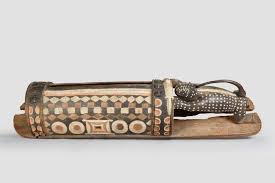In a landmark decision marking a step forward in cultural restitution, French lawmakers have unanimously passed legislation to return the Djidji Ayôkwé talking drum to Côte d’Ivoire, 108 years after it was forcefully taken by colonial troops. The three-metre-long, 430-kilogram sacred drum was seized in 1916 from the Atchan people, a subgroup of the Ebrié ethnic group, after they resisted forced labour for road construction during French colonial rule.
Historically used to transmit messages across villages in precolonial times, the drum held both cultural and spiritual significance for the Tchaman (Ebrié) people. It was first exhibited in Paris in 1922 and has since remained in the collections of the Musée du Quai Branly – Jacques Chirac, a museum known for its large inventory of non-European art, much of which was acquired during the colonial period.
Until now, the return of the drum was stalled by France’s strict laws protecting public museum collections. A specific legal exemption was required for its restitution, underscoring the complexity of returning looted heritage items to former colonies. The vote by French lawmakers not only overrides this legal barrier but also signals a growing recognition of the injustices of colonial-era cultural theft.
President Emmanuel Macron had promised to return the drum during a 2021 visit to Côte d’Ivoire, but without a comprehensive legal framework for restitution, progress had been slow. This unanimous parliamentary vote represents a breakthrough.
Maurice Kouakou Bandaman, Côte d’Ivoire’s ambassador to France and former Minister of Culture, praised the decision, stating that lawmakers had acknowledged “the full value of this artefact, the wrong that was done to Côte d’Ivoire, to the Bidjan people, to the Tchaman (Ebrié) people, through this theft.”
The restitution of the Djidji Ayôkwé talking drum is not only a symbolic gesture of justice but also a catalyst in the broader global movement urging former colonial powers to return cultural heritage artifacts to their rightful communities. It adds pressure for more structured policies and legal frameworks around the repatriation of African cultural heritage from European institutions.














Leave a comment